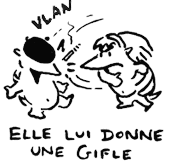Adjectives
adjectives whose meaning varies with placement
Some adjectives can be placed either before or after the noun they are describing. Their position determines their meaning. When the adjective is placed before the noun it tends to carry a figurative, or metaphorical meaning. When it follows the noun, it carries a more literal, or actual meaning. Consider the following examples:
| adjective | literal sense following the noun |
figurative sense before the noun |
| ancien | Paw-Paw adore les meubles anciens.
Paw-Paw adores very old furniture. |
Marianne est l’ancienne copine de Tex.
Marianne is Tex’s former girlfriend. |
| cher | Tammy aime les parfums chers de Paris.
Tammy likes expensive perfumes from Paris. |
Chers amis, je suis content de vous voir!
Dear friends, I am happy to see you! |
| dernier | Tex a vu Marianne la semaine dernière.
Tex saw Marianne last [preceding] week. |
Tex dit à Marianne: Pour la dernière fois, je ne veux plus te voir.
Tex says to Marianne: For the last [final] time, I don’t want to see you anymore. |
| grand | En général, les tatous ne sont pas grands.
In general, armadillos are not tall. |
Tex est un grand philosophe.
Tex is a great philosopher. |
| même | Bette est l’hypocrisie même!
Bette is hypocrisy itself! |
Tammy et Bette adorent le même petit tatou.
Tammy and Bette adore the same little armadillo. |
| pauvre | A son arrivée à Austin, Tex était un tatou pauvre.
When he came to Austin, Tex was a financially poor armadillo. |
Le pauvre Tex était malheureux quand il a quitté la France.
The unfortunate Tex was not happy when he left France. |
| prochain | Mes chers étudiants, la semaine prochaine vous avez un examen.
My dear students, next [in a series] week you have an exam. |
Tex dit à Marianne: Et la prochaine fois que tu me suis, j’appelle la police!
Tex says to Marianne: And the next [following] time that you follow me, I will call the police. |
| propre | Mais oui, Edouard est un escargot propre!
Yes, Edouard is a clean snail. |
Edouard veut son propre restaurant.
Edouard wants his own restaurant. |
| seul | Corey est seul. C’est un cafard.
Corey is alone. He’s a cockroach. |
Dans le coeur de Tex, Tammy est le seul tatou qui compte.
In Tex’s heart, Tammy is the only armadillo that matters. |
| simple | Bette n’est pas simple.
Bette is not simple [uncomplicated] |
Tex n’est pas un simple poète, c’est aussi un philosophe.
Tex is not just a poet, he is also a philosopher. |
| vrai | Paw-Paw a raconté des histoires vraies sur sa vie pendant la guerre.
Paw-Paw told true stories about his life during the war. |
Les aventures de Tex et ses copains, c’est une vraie histoire.
The adventures of Tex and his friends are a real story! |
Listen to this dialogue:
| Tammy attend Tex à la bibliothèque depuis une heure. Enfin il arrive. | Tammy has been waiting for Tex at the library for an hour. Finally, he arrives. | |
| Tammy (ironique): Ne te presse pas mon cher Tex! Tu oublies tes propres rendez-vous maintenant?! | Tammy (ironic): Take your time my dear Tex! Are you forgetting your own appointments now?! | |
| Tex: Ah, Tammy, ma chérie! J’étais au café avec mon grand ami Edouard, quand j’ai vu une femme seule. Elle avait l’air triste. Elle était le désespoir même. Et la beauté même … | Tex: Oh, Tammy, darling, I was at the cafe with my great friend Edouard, when I saw a lonely woman. She looked sad. She was despair itself! Beauty itself also … | |
| Tammy (toujours furieuse): Et alors? | Tammy (still furious): So what? | |
| Tex: Eh bien? Tu me connais! Je suis un brave tatou! Alors, je suis allé lui offrir un café pour la consoler. | Tex: So? You know the way I am! I am a good armadillo! So I went and bought her a coffee to console her. | |
| Tammy: Ah oui? | Tammy: Oh really? | |
| Tex: Aïe! |


